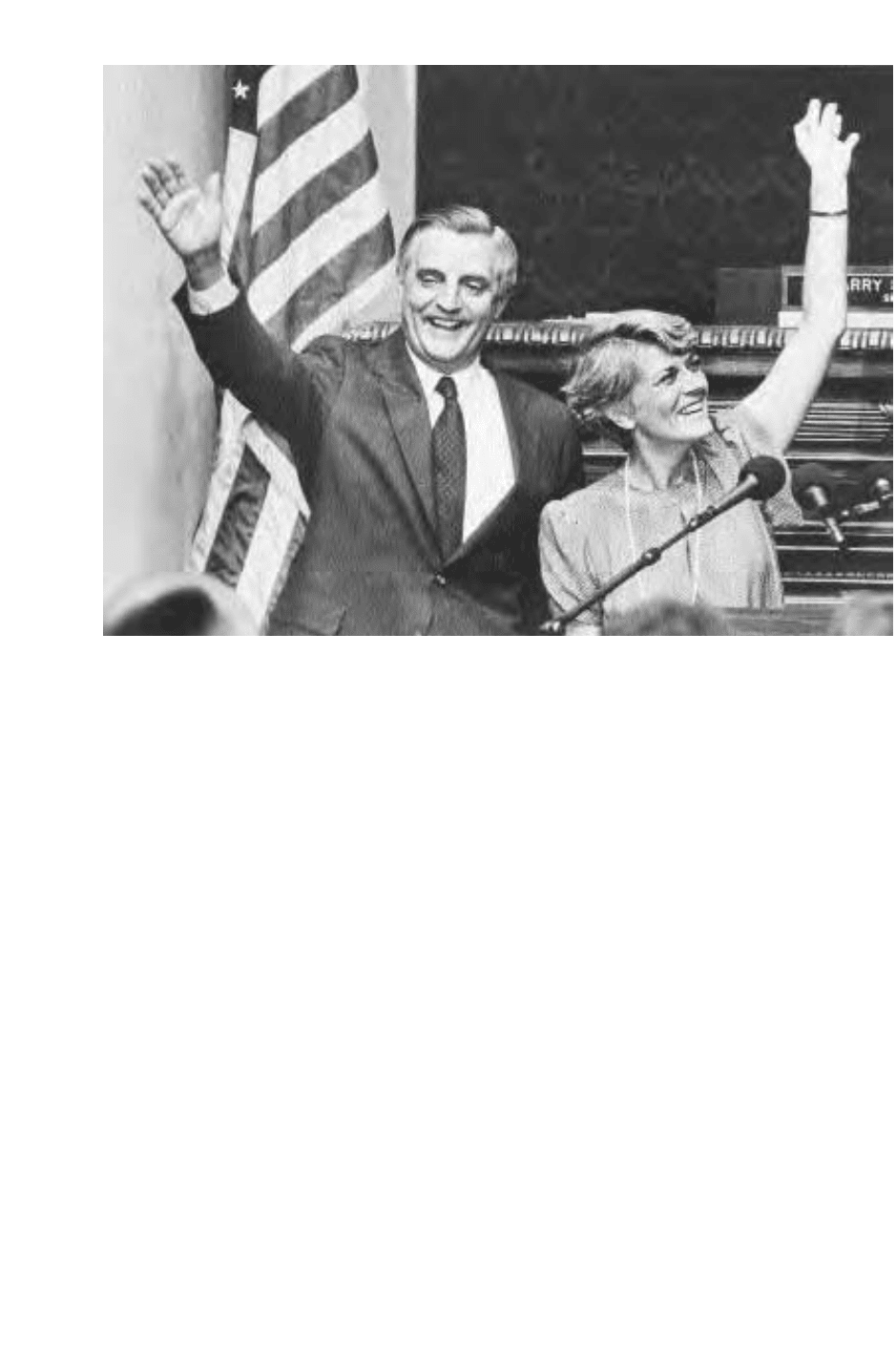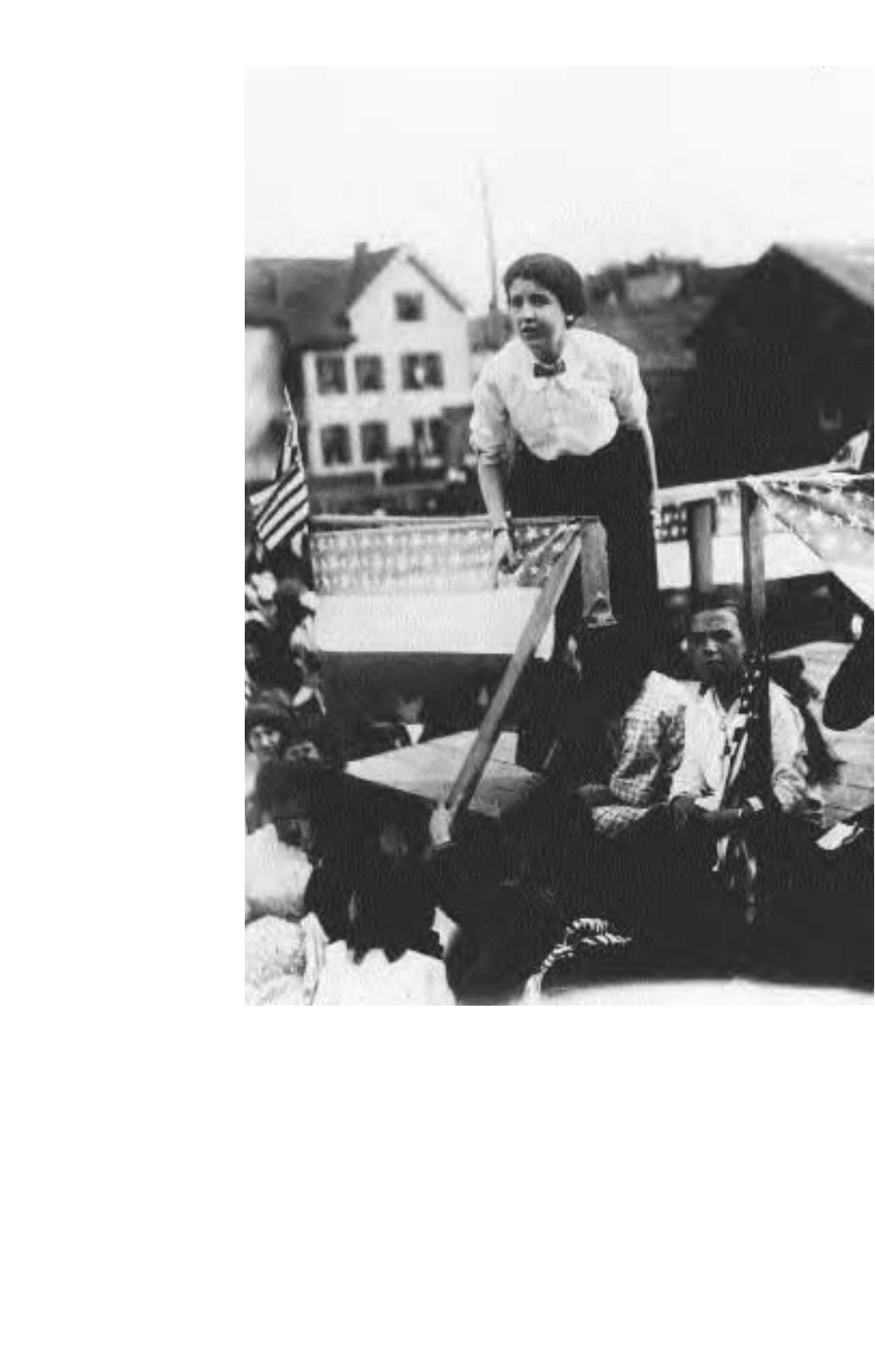Schenken Suzanne O’Dea. From Suffrage to the Senate: An Encyclopedia of American Women in Politics (2 Volumes)
Подождите немного. Документ загружается.


vide for their families, that abortion was murder and should be illegal, and
that women did not need an ERA because they had enough equality. In the
1970s and 1980s, the conservative movement matured, gained increasing
power, and slowed or reversed some of the changes feminists had made.
In the 1990s, feminist proposals that had once been considered rad-
ical became accepted and were enacted or implemented. The Family and
Medical Leave Act of 1993, federal funding for child day care, child sup-
port enforcement, and expanded roles for women in the military are a few
examples. Although feminists may have been among the first proponents
of these measures, they became public policy as a result of broad-based
public and congressional support for them.
See also Abortion; American Association of University Women; Civil Rights Act
of 1964, Title VII; Displaced Homemakers; Domestic Violence; Equal Rights
Amendment; The Feminine Mystique; Friedan, Betty Naomi Goldstein; League
of Women Voters; National Organization for Women; National Women’s
Political Caucus; Pay Equity; President’s Commission on the Status of Women;
Violence Against Women Act of 1994
Feminists for Life of America
Founded in 1972, Feminists for Life of America (FFLA) is a national net-
work with thirty-six state chapters and 3,500 members that opposes abor-
tion, infanticide, capital punishment, and euthanasia. FFLA supports jus-
tice, nonviolence, and nondiscrimination, lobbies state legislatures for its
agenda, and provides support for women in need.
Working under the slogan “Pro Woman—Pro Life,” FFLA argues that
violence, including abortion, euthanasia, and capital punishment, is in-
consistent with core feminist principles of nonviolence, equality, and jus-
tice and that abortion physically and psychologically harms women. The
organization claims that Susan B. Anthony, Matilda Joslyn Gage, Alice
Paul, and other early feminists were prolife.
See also Anthony, Susan Brownell; Feminist Movement; Gage, Matilda Joslyn;
Paul, Alice
References www.serve.com/fem4life.
Feminization of Poverty
The feminization of poverty describes a phenomenon, recognized in 1978
by a sociologist, that almost one-half of the poor people in the United
States lived in households headed by women and that two-thirds of poor
U.S. adults were women. Several factors contribute to the feminization of
poverty, including teenage motherhood and divorce. Two other factors,
sexism and racism, contribute to poverty through the undercompensation
of employed women and people of color.
Feminization of Poverty 265

Not only do many women earn less than men but also they are more
likely to have the economic burden of supporting their dependent chil-
dren. Teenage mothers often have full financial responsibility for their
children, and when fathers contribute to their children’s support, the pay-
ments are small. In addition, teenagers have few resources to support
themselves and their children because their education does not prepare
them for jobs that provide adequate compensation to raise them above
the poverty level.
Divorce affects the financial status of women and their dependent
children more negatively than it does men. A year after divorce, on aver-
age, men’s standard of living increases by 42 percent, whereas that of di-
vorced women and their children decreases by 73 percent. For women
who had been full-time homemakers, reentering the workforce poses sig-
nificant challenges and often requires them to obtain or update job skills.
Alimony and child support can ease the economic difficulties, but
the amounts allocated by the courts are often inadequate or not paid. Un-
able to collect child support, some women and their children become wel-
fare recipients. In response, states and the federal government have incre-
mentally increased child support enforcement laws. Beginning in the
1980s, the federal government implemented several policies to assist in the
collection of child support payments and to provide incentives to states to
assist custodial parents to whom child support was due.
Sexism contributes to the feminization of poverty in that employed
women earn only about 70 percent of the wages that employed men earn.
Even though the Equal Pay Act of 1963 requires equal pay for equal work,
the gap between women’s and men’s earnings persists. In addition, the
sex-segregated nature of the labor market tends to relegate women to low-
paying, low-status jobs with little prospect for advancement. These differ-
ences in men’s and women’s earnings and potential earnings continue
throughout women’s work lives and into retirement, because retirement
benefits, whether private plans or Social Security, are based on earnings.
Racism, like sexism, contributes to the feminization of poverty. Peo-
ple of color experience discrimination in employment, advancement, and
pay. For women of color, the combination of racism and sexism works to
make them the lowest category of wage earners.
See also Child Support Enforcement; Displaced Homemakers; Divorce Law
Reform
References Gimenez, “The Feminization of Poverty: Myth or Reality?” (1990);
Riley, Divorce: An American Tradition (1991); www.cdc.gov.
266 Feminization of Poverty

Fenwick, Millicent Hammond (1910–1992)
Republican Millicent Fenwick of New Jersey served in the U.S. House of
Representatives from 3 January 1975 to 3 January 1983. Fenwick entered
politics in the 1930s, working in campaigns and serving on the state Re-
publican committee. She served on the Bernardsville Board of Education
from 1938 to 1941, the New Jersey Advisory Committee to the U.S. Com-
mission on Civil Rights in 1957, and the Bernardsville Borough Council
from 1958 to 1964, the first woman to serve on it. In 1970, Fenwick won
an open seat in the New Jersey legislature, where she passed a bill pro-
hibiting discrimination in hiring on the basis of race, creed, national ori-
gin, ancestry, age, marital status, or sex. She also passed measures estab-
lishing minimum wages for agricultural workers and requiring toilet
facilities for agricultural workers. She worked for equal rights for women,
environmental protection, education, and penal reform.
When Fenwick ran for Congress, she refused to accept money from
political action committees, reflecting her commitment to honesty and
openness in Congress. As a member of Congress, she supported the Equal
Rights Amendment, federal funding for abortions, and the food stamp
program. Her other interests included securing human rights, promoting
the use of synthetic fuels, and ending the “marriage penalty” in tax law.
Fenwick was known for her dignity and elegance, for her outspoken com-
ments on the House floor, and for her habit of smoking a pipe. Fenwick
unsuccessfully ran for the U.S. Senate in 1982.
Born in New York, New York, Millicent Fenwick interrupted her ed-
ucation when she was fifteen to live in Spain while her father served as
ambassador to that country. She attended Columbia University in 1933
and the New School for Social Research in 1942. A model for Vogue mag-
azine, she was an associate editor for that and other Condé Nast publica-
tions from 1938 to 1948 and wrote Vogue’s Book of Etiquette in 1948.
See also Abortion; Congress, Women in; Equal Rights Amendment; State
Legislatures, Women in
References Office of the Historian, U.S. House of Representatives, Women in
Congress, 1917–1990 (1991); Tomlinson, “Making Their Way: A Study of New
Jersey Congresswomen, 1924–1994” (1996).
Ferguson, Miriam Amanda Wallace (1875–1961)
Democrat Miriam “Ma” Ferguson served as governor of Texas from 1925
to 1927 and from 1933 to 1935. She entered politics as a surrogate for her
husband James Ferguson, who served as governor from 1915 to 1917. Fol-
lowing impeachment, conviction, and removal from office for mishan-
dling of state funds in 1917, James Ferguson was banned from holding
Ferguson, Miriam Amanda Wallace 267

public office. He worked to have the restriction removed but failed and re-
cruited his wife to become a candidate for governor. To emphasize the ac-
tive role that James Ferguson expected to play if Miriam Ferguson won the
election, she used the campaign slogan “Two Governors for the Price of
One.” In the course of the campaign, Miriam Ferguson gained a nickname
she disliked when a newspaper used her first initials, M(iriam)A(manda),
in a headline, but she incorporated it into a campaign slogan,“Me for Ma.”
Miriam Ferguson campaigned against the Ku Klux Klan and openly
supported tolerance for Catholics and Jews. She promised economy in
government, leniency in the administration of Prohibition laws, and im-
proved administration of the state penitentiaries. Elected in 1924, she be-
came the second woman governor in the United States, following Nellie
Tayloe Ross of Wyoming, who also began her term in 1925.
Governor Miriam Ferguson targeted the Ku Klux Klan by passing a
bill that outlawed the use of masks. She convinced the legislature to re-
store her husband’s political rights, but the state supreme court found the
act unconstitutional. Although controversy surrounded both of the ac-
tions, allegations that her office was selling pardons and paroles actually
led to her defeat in 1926. She ran for governor again in 1930 and lost.
In 1932, Ferguson won a second term as governor. Taking office dur-
ing the depths of the Depression, she declared a bank holiday two days be-
fore President Franklin D. Roosevelt’s national bank holiday. The legisla-
ture passed her requests for congressional redistricting and the
legalization of gambling on horse races and prizefighting but refused to
approve a sales tax or a corporate income tax. She did not seek reelection
in 1934 but tried unsuccessfully in 1940.
Born in Bell County, Texas, Miriam Ferguson attended Baylor Fe-
male College. She married James Edward Ferguson in 1899 and devoted
herself to raising their children while James Ferguson founded a bank and
became active in politics.
See also Governors, Women; Ross, Nellie Tayloe
References Sicherman and Green, eds., Notable American Women: The Modern
Period (1980).
Ferraro, Geraldine Anne (b. 1935)
Democrat Geraldine Ferraro of New York served in the U.S. House of
Representatives from 3 January 1979 to 3 January 1985. She held the lead-
ership position of secretary of the House Democratic Caucus in the 97th
and 98th Congresses (1981–1983 and 1983–1985). She was the Demo-
cratic candidate for vice president of the United States in 1984, the first
woman ever nominated for the office by a major party.
268 Ferraro, Geraldine Anne

Born in Newburgh, New York, Ferraro received her bachelor’s de-
gree in English from Marymount College in 1956 and her law degree
from Fordham University in 1960. For the next fourteen years, Ferraro
held part-time legal positions and worked in Democratic politics while
raising her children. In 1974, she became an assistant district attorney for
Queens County, New York, in the Investigations Bureau and the next year
became chief of the county’s Special Victims Bureau, which handled
child abuse, domestic violence, and rape cases. She left after four years to
run for Congress.
As a member of Congress, Ferraro was frustrated by her male col-
leagues’ seeming indifference to women’s issues, particularly economic
ones, including pay rates, health insurance, and pension inequities. Fer-
raro also supported federal funding for abortions, defended displaced fed-
eral workers, worked for increased federal funds for mass transit, sup-
ported tuition tax credits, and opposed busing.
At the 1983 National Women’s Political Caucus (NWPC) conven-
tion, Ferraro met with other women leaders to discuss potential women
candidates for president and vice president of the United States. Ferraro
told the group that she did not see any good possibility that any of the
male contenders for the presidency would select a woman for their vice
presidential running mate. Walter Mondale, however, told the convention
Ferraro, Geraldine Anne 269
Representative
Geraldine Ferraro
(D-NY) was the first
woman to run for
U.S. vice president on
a major party ticket
(shown here with
presidential
candidate Walter
Mondale), 1984
(Corbis/Bettmann)

that he would consider a woman. When he became a leading contender
for the Democratic Party’s nomination, the NWPC, the National Organi-
zation for Women, and other powerful female Democrats pressured him
to choose a woman. Mondale selected Ferraro.
When the 1984 Democratic National Convention met, delegates first
elected Mondale for their presidential nominee and then Ferraro as their
vice presidential candidate, making her the first woman to be a major
party’s nominee for vice president. She acknowledged that the nomina-
tion came to her in part because she was a woman but insisted she was
qualified for it.
Two weeks after receiving the nomination, the first of a series of sto-
ries that questioned Ferraro’s integrity and her husband John Zaccaro’s
honesty appeared. Ferraro’s handling of congressional financial disclosure
statements was questioned, and Zaccaro’s real estate transactions as well
as other financial dealings were investigated. More damaging stories fol-
lowed. Zaccaro’s initial refusal to release his income tax returns prompted
speculation that he was hiding illegal activities. Then a story about im-
proper loans that family members had made to Ferraro’s 1978 congres-
sional campaign appeared, even though she had reported the transactions
at the time and paid a fine. The negative media attention diminished after
Zaccaro released his tax information and Ferraro held a news conference
reviewing the family’s finances.
Ferraro’s prochoice stand on reproductive rights became the next is-
sue in the campaign. A Roman Catholic, Ferraro argued that although
abortion might not be an option for her, she believed that it should be a
protected right for women. Roman Catholic archbishop John O’Connor
of New York attacked her and others who shared her beliefs, pressuring
her to change her position on abortion, but she remained firm.
Mondale and Ferraro lost in the general election. Having surrendered
her congressional seat to run for the vice presidency, Ferraro became a po-
litical commentator. She unsuccessfully sought her party’s nomination for
the U.S. Senate in 1992 and lost a second bid for the Senate in 1998.
See also Abortion; Congress, Women in; Democratic Party, Women in the;
National Organization for Women; National Women’s Political Caucus;
President and Vice President, Women Candidates for
References Ferraro, Ferraro: My Story (1985); Office of the Historian, U.S.
House of Representatives, Women in Congress, 1917–1990 (1991).
Fiedler, Roberta (Bobbi) Frances Horowitz (b. 1937)
Republican Bobbi Fiedler of California served in the U.S. House of Repre-
sentatives from 3 January 1981 to 3 January 1987. A fiscal conservative
who generally supported President Ronald Reagan’s policies, she disagreed
270 Fiedler, Roberta (Bobbi) Frances Horowitz

with some of his positions. Most notably, she supported the Equal Rights
Amendment and a proposal for women’s economic equity. She did not
seek a fourth term in the House; instead, she ran for the U.S. Senate but
lost in the Republican primary.
After leaving Congress, Fiedler was a government and public affairs
consultant. In 1993, she was appointed to the Board of Commissioners of
the Los Angeles Community Redevelopment Agency.
Born in Santa Monica, California, Fiedler attended Santa Monica
City College and Santa Monica Technical School from 1955 to 1959. She
was an interior decorator from 1957 to 1960 and owned a drugstore from
1969 to 1977. Opposed to a busing plan to desegregate Los Angeles
schools, she and others organized BUSTOP in 1976, which led to her elec-
tion to the Los Angeles School Board, where she served from 1977 to 1981.
See also Congress, Women in; Economic Equity Act; Equal Rights Amendment
References Congressional Quarterly, Politics in America: Members of Congress
in Washington and at Home (1983); Office of the Historian, U.S. House of
Representatives, Women in Congress, 1917–1991 (1991).
Fifteenth Amendment
The Fifteenth Amendment sought to guarantee suffrage to male former
slaves following the Civil War. Congress sent the Fifteenth Amendment to
the U.S. Constitution to the states on 27 February 1869, and it was ratified
on 30 March 1870. As with the Fourteenth Amendment ratified before it,
woman suffragists fought to include women in the Fifteenth Amendment
but failed.
The text of the first section of the Fifteenth Amendment is as follows:
“The right of citizens of the United States to vote shall not be denied or
abridged by the United States or by any State on account of race, color, or
previous condition of servitude.”
Although some abolitionists insisted that former slaves needed the
protection granted by the amendment, woman suffragists opposed the
amendment’s passage and ratification because it did not include African
American women or other women and granted suffrage only to African
American males. Republicans who supported the amendment believed
that they could depend upon African Americans to vote Republican, but
women’s votes would not be as reliable.
With the ratification of the Fifteenth Amendment, the woman suf-
frage movement became increasingly racist. Woman suffrage leaders, in-
cluding Elizabeth Cady Stanton and Carrie Chapman Catt, began calling
for enfranchisement of women to counter African American males’ votes.
Women gained suffrage rights with the ratification of the Nineteenth
Amendment in 1920, but except for a brief period in the 1870s during
Fifteenth Amendment 271

Reconstruction, no African Americans—women or men—living in the
South could fully exercise their rights until passage of the Voting Rights
Act of 1965.
See also Catt, Carrie Clinton Lane Chapman; Fourteenth Amendment;
Nineteenth Amendment; Stanton, Elizabeth Cady; Suffrage; Voting Rights
Act of 1965
Finney, Joan (b. 1925)
Democrat Joan Finney served as governor of Kansas from 1991 to 1995.
Finney entered politics as a member of a U.S. senator’s staff in 1953, was
Kansas commissioner of elections from 1970 to 1972, and was adminis-
trative assistant to the mayor of Topeka from 1973 to 1974. An unsuccess-
ful candidate for the U.S. House in 1972, Finney won election as Kansas
state treasurer, serving from 1975 to 1991. After serving one term as gov-
ernor, she did not run for reelection.
Born in Topeka, Kansas, Joan Finney earned her bachelor’s degree
from Washburn University in 1974.
See also Governors, Women
References Mullaney, Biographical Directory of the Governors of the United States
1988–1994 (1994).
Flint Auto Workers’ Strike
On 30 December 1936, auto workers at the Flint, Michigan, General Mo-
tors (GM) plant sat down, beginning a strike that spread to 140,000 GM
workers and involved more than 50 percent of the company’s plants. They
demanded recognition of the United Auto Workers (UAW) as their exclu-
sive bargaining agency. On 31 December, fifty women formed the
Women’s Auxiliary to support the striking men by cooking food for them,
establishing a first aid station, and distributing literature. They also estab-
lished a day care center for striking women, ran picket lines, managed a
speakers’ bureau, and organized entertainment.
When police attempted to stop women from taking food to the strik-
ers, turned off the heat, and lobbed tear gas into an occupied building,
women formed the Women’s Emergency Brigade. Armed with rolling
pins, brooms, and mops for weapons, members of the brigade formed a
line around male pickets, forcing police to shoot at them first. On 11 Feb-
ruary 1937, strikers and GM reached an agreement that included recogni-
tion of the UAW as the collective bargaining agent and GM’s pledge that
it would not interfere with employees joining unions.
The Women’s Emergency Brigade became a model for union sup-
porters in other automobile manufacturing cities. The Women’s Auxiliary
272 Finney, Joan

and the Women’s Emergency Brigade helped sustain strikers’ morale and
contributed to the success of the strike. In addition, women gained new
organizational and leadership skills and developed a sense of power.
See also Coalition of Labor Union Women; Lawrence Textile Mill Strike;
Shirtwaist Workers Strike; Triangle Shirtwaist Company Fire
References Foner, Women and the American Labor Movement: From the First
Trade Unions to the Present (1982); Wertheimer, We Were There: The Story of
Working Women in America (1977).
Flynn, Elizabeth Gurley (1890–1964)
Elizabeth Gurley Flynn was president of the U.S. Communist Party from
1961 until her death in 1964. Flynn entered the political arena when she was
a high school student, giving speeches on soapboxes in New York. Arrested
in 1906 during a speech, she was expelled from high school and began or-
ganizing for the Industrial Workers of the World (IWW). Between 1908
and 1917, Flynn’s work took her across the country as she participated in
the IWW’s fights for freedom of speech in Montana, Washington, and other
western states and in labor strikes in Massachusetts, New York, and New
Jersey, working on behalf of textile and silk workers and cooks and waiters.
She left the IWW in 1917 because of a disagreement over strategy.
In the 1920s, Flynn worked to free Nicola Sacco and Bartolomeo
Vanzetti, Italian-born anarchists accused of murdering two men during a
payroll robbery. She organized mass rallies, raised money for their de-
fense, and engaged lawyers to represent them. Their executions in 1927
convinced Flynn that capitalist justice was no justice.
A founding member of the American Civil Liberties Union (ACLU)
in 1920, Flynn’s commitment to the organization’s importance came from
her own experiences. She believed that her civil rights had been violated
every time she had been arrested. She served on the ACLU’s board until
1940, when she was expelled from it because of her membership in the
Communist Party.
Flynn’s leadership in the U.S. Communist Party began with her elec-
tion to its governing board in 1941. She became more visible when she led
resistance to the Internal Securities Act, which required all Communist
groups to register with the U.S. attorney general. One of the 135 plaintiffs
in an unsuccessful lawsuit to have the act declared unconstitutional, she
was convicted of conspiracy to overthrow the government in 1951 and
was sentenced to three years in prison and fined $6,000.
Elected the first woman president of the U.S. Communist Party in
1961, Flynn successfully challenged the Subversive Activities Control Act
of 1950. Flynn’s passport was revoked in 1962 for her Communist Party
activities. She appealed and won in 1964, when the U.S. Supreme Court
Flynn, Elizabeth Gurley 273

found that she had been denied due process of law. She went to Moscow,
where she died. A state funeral was held for her in Red Square.
Born in Concord, New Hampshire, Flynn published I Speak My Own
Piece: Autobiography of the “Rebel Girl” in 1955.
References Camp, Iron in Her Soul: Elizabeth Gurley Flynn and the American
Left (1995); H. W. Wilson, Current Biography Yearbook, 1961 (1961).
274 Flynn, Elizabeth Gurley
Elizabeth Gurley
Flynn, Communist
activist (Brown
Brothers)
